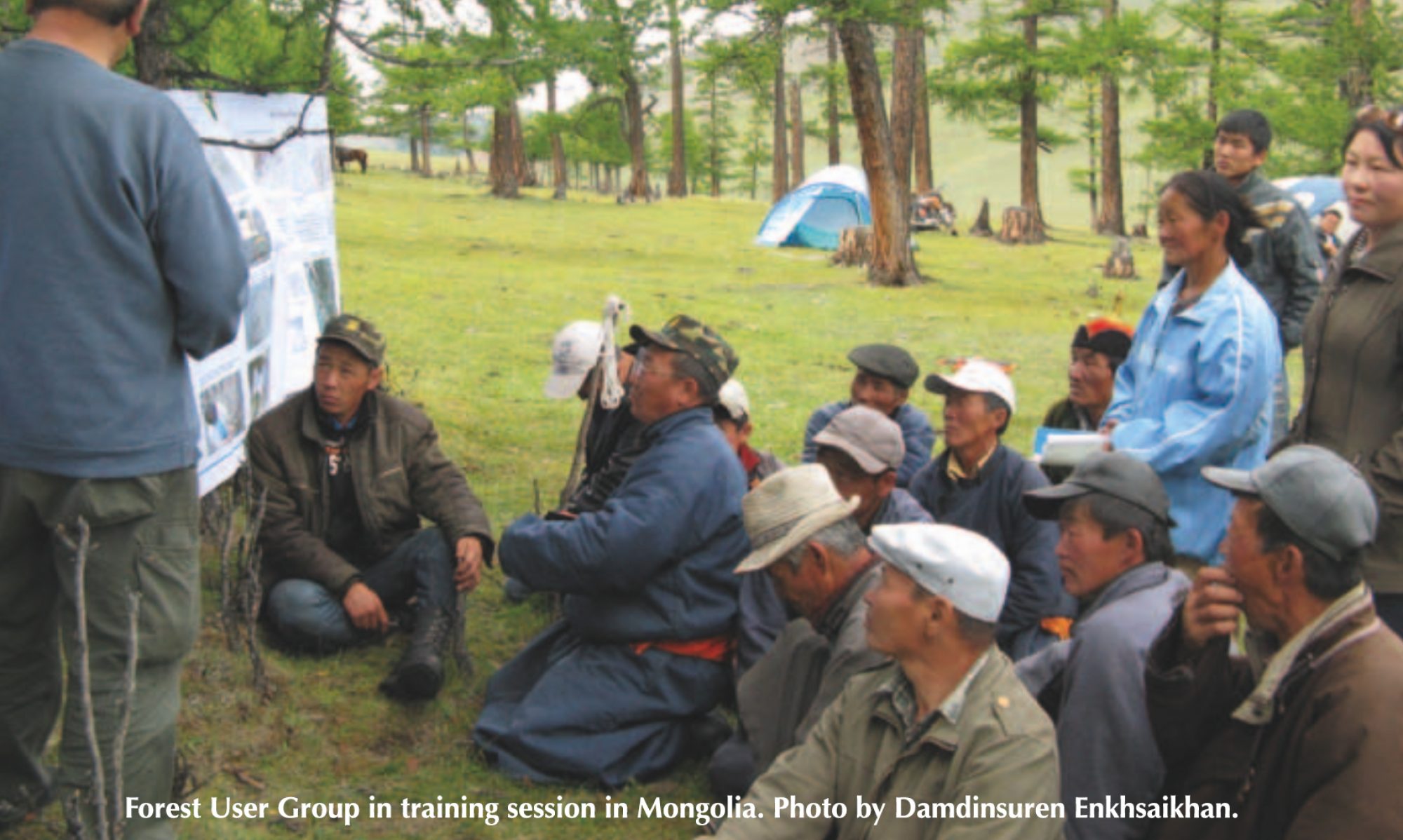An example of an institution that is making progress in advancing the outcomes of Community Based Forestry is The Federation of Community Forest Users, Nepal or FECOFUN.[1] FECOFUN was founded in 1995 from a ground up, not top down organizational structure.[2] It started with small, local groups that started organizing together in the early 1990s. Around 1993 some national seminars were held on Community Based Forestry, and people who attended were able to use these events to network with a wider community to discuss forestry agendas including the rights of those involved in the CBFMs and to begin to discuss ways to form into a national organization.[3] Around this time some donors and researchers were hoping to change the role of government forestry staff into more of a consultation role that could help those local members of CBFMs be more successful. In 1995 FECOFUN registered with the government as an NGO and established a constitution, and sought to set up districts throughout Nepal.[4] FECOFUN outlined its main objectives which include:
- Secure community rights including forest land tenure
- Enhance grass root level democracy
- Policy advocacy and legal support
- Sustainable management of forest
- Climate change, biodiversity and environmental conservation
- Renewable Energy technology and energy efficiency
- Women empowerment, gender equity and social inclusion
- Livelihood promotion through timber and non-timber forest products-based enterprises
- Working together to achieve the Sustainable Development Goals (“Policy Advocacy”).
Today FECOFUN is present in 520 local Forest User Groups and 77 larger districts across Nepal with over 22,226 user groups involved.[6] The Executive Committee consists of 50% women, and the constitution requires that 50% of all position be filled by women.[7] Recently there has been discussion of focusing on other disadvantaged groups including ethnic minorities.
Currently FECOFUN works to support local institutions and user rights for the access, use and management of forest resources.[8] They also encourage members to participate in developing policies that relate to forest user groups. One of FECOFUNs successful campaigns was to stop the government from turning the management of forests over to private companies and kept the rights for the local forest user groups.[9] Because FECOFUN sometimes works against the Nepal governments proposed actions, funding for the institution has to come from outside sources which include mostly large donors including the World Bank and USAid.[10]
In comparing FECOFUN to our definition of Sustainability, it is clear that this institution meets the goals we defined. By seeking to make sure that forest resources are sustainably used and that the local users are the ones involved in policy making, FECOFUN is working to “meet the needs of the present generation without compromising the needs of future generations.”

FECOFUN seeks to empower women in many ways, and this relates to our definition of Sustainability that includes “eliminate exploitation.” FECOFUN ensures that 50% of positions in the institution are filled by women, and further, has adopted a Commitment Against Gender Based Violence which outlines in detail its “zero tolerance policy against sexual abuse”.[11]
In addition, FECOFUN lists as an objective “to implement programs related to basic services like education, health, drinking water, communication, and transportation at the community level”, which meets our Sustainability definition that calls for basic human rights for all people.[12] By being a “ground up” organization, FECOFUN is based on collective, transparent individual participation which also makes it compatible with our Sustainability definition. FECOFUN does face some challenges, however. Because it often takes on the government on policy issues, funding comes mostly from donors. Less than 4% of its funding come from the small membership fees it charges groups for registration, and the rest comes from a few large donors. Since FECOFUN does not want to become influenced by the agenda of any of its large donors, it is looking for ways to become self-funded.[13]
Overall, FECOFUN provides a strong roadmap for other organizations in other countries looking to provide support and growth for their CBFM programs while at the same time meeting the goals of Sustainability.
[1] “Policy Advocacy,” Federation of Community Users, Nepal. Web. October 19, 2019. http://fecofun.org.np/policyadvocacy.php.
[2]Stephen Biggs and Don Messerschmidt,”Case Study 3 – CFUG Federation: institutional innovation in practice.” Food and Agricultural Organization of the United Nations. December 2003. Web. http://www.fao.org/3/ad686e/ad686e08.htm.
[3]“Forty years of community-based forestry: A review of its extent and effectiveness.” Food and Agricultural Organization of the United Nations. Web. http://www.fao.org/3/a-i5415e.pdf.
[4] “Policy Advocacy,” Federation of Community Users, Nepal. Web. October 19, 2019. http://fecofun.org.np/policyadvocacy.php.
[5]Ibid.
[6]Ibid.
[7] Biggs, Food. http://www.fao.org/3/ad686e/ad686e08.htm.
[8]Ibid.
[9]Ibid.
[10] Ibid.
[11] “Policy Advocacy,” Federation of Community Users, Nepal. Web. October 19, 2019. http://fecofun.org.np/policyadvocacy.php.
[12]Ibid.
[13]Biggs, Food. http://www.fao.org/3/ad686e/ad686e08.htm
Bibliography
Biggs, Stephen and Don Messerschmidt. “Case Study 3 – CFUG Federation: institutional innovation in practice.” Food and Agricultural Organization of the United Nations. December 2003. Web. October 19, 2019. http://www.fao.org/3/ad686e/ad686e08.htm.
“Forty years of community-based forestry: A review of its extent and effectiveness.” Food and Agriculture Organization of the United Nations. Web. October 19, 2019. http://www.fao.org/3/a-i5415e.pdf.
“Policy Advocacy.” Federation of Community Users, Nepal. Web. October 19, 2019. http://fecofun.org.np/policyadvocacy.php
